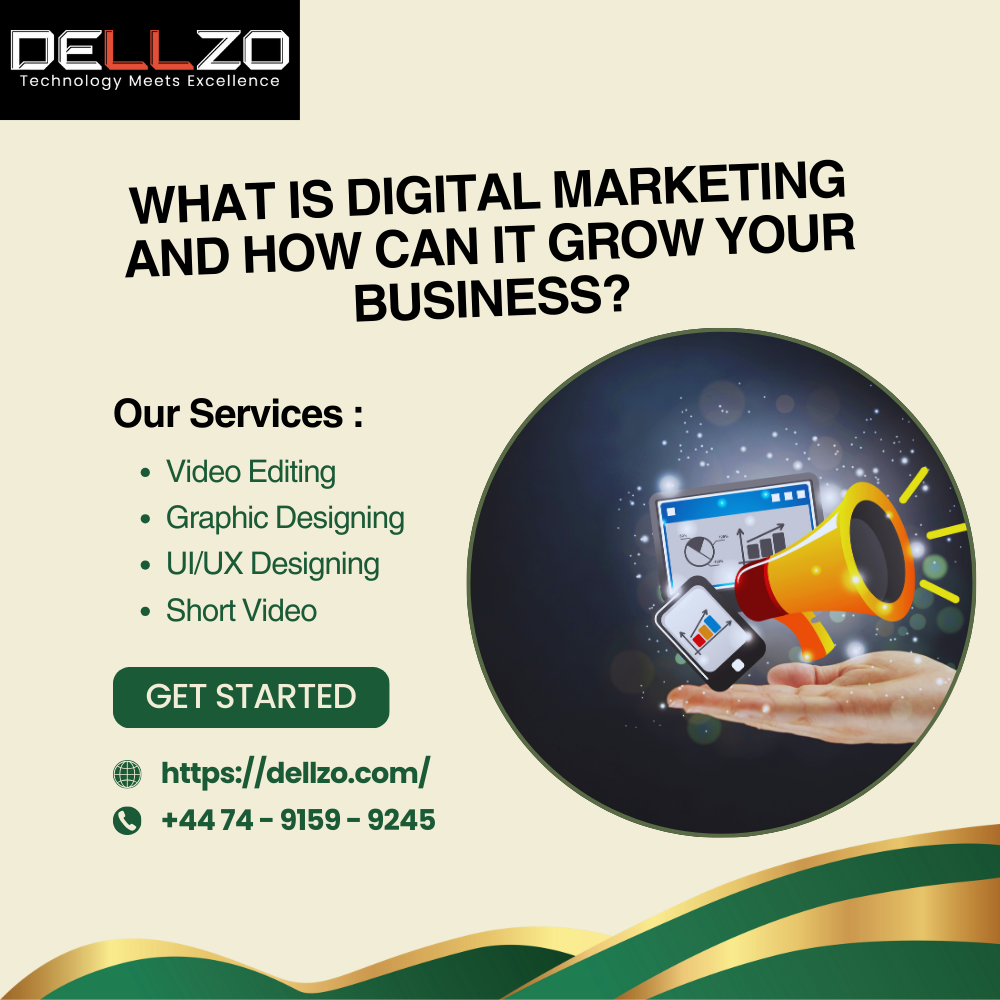
What Is Digital Marketing And How Can It Grow Your Business?
In today’s world, almost everything happens online from shopping to booking services to finding local restaurants. That’s why digital marketing has become one of the most powerful tools for businesses in the U.S. Whether you’re running a small coffee shop in New York or an e-commerce store that ships across the country, digital marketing can help you reach more people and grow faster than traditional marketing ever could.
What is Digital Marketing?
Digital marketing is simply promoting your products or services online. Instead of relying only on billboards, TV ads, or flyers, digital marketing uses tools like social media, websites, search engines, and email to connect with customers. Some common forms include:
- Social Media Marketing (Facebook, Instagram, TikTok, LinkedIn)
- Search Engine Optimization (SEO) (getting found on Google)
- Email Marketing (sending updates, offers, or newsletters)
- Pay-Per-Click Ads (PPC) (like Google Ads or Facebook Ads)
- Content Marketing (blogs, videos, and helpful guides)
How Can Digital Marketing Grow Your Business?
- Reach More Customers
With millions of Americans spending hours online every day, digital marketing helps you connect with people where they already are—on their phones and laptops. - Target the Right Audience
Unlike traditional ads, digital marketing allows you to reach specific groups like “people in Los Angeles who love fitness” or “new parents in Texas.” This means your efforts are more effective and waste less money. - Build Trust and Brand Awareness
When people see your business online consistently through helpful posts, reviews, or ads they start to recognize and trust your brand. - Cost-Effective Growth
Generally speaking, digital marketing is less expensive than print or television advertisements. Even small businesses can run a Facebook ad campaign with just $5–$10 a day and start seeing results. - Measure and Improve Results
The best part? You can track everything who clicked your ad, how many people visited your website, and even how many made a purchase. This makes it easier to improve your strategy and grow faster.
What Are The 7 Types Of Digital Marketing?
Digital marketing comes in different forms, and seven of the most popular types are search engine optimization (SEO), pay-per-click advertising (PPC), social media marketing, content marketing, email marketing, affiliate marketing, and influencer marketing. SEO helps your website rank higher on search engines, making it easier for people to find you. PPC involves running paid ads that bring instant visibility and traffic. Social media marketing focuses on engaging with audiences on platforms like Facebook, Instagram, and LinkedIn. Content marketing uses blogs, videos, and articles to provide value and build trust. Email marketing connects directly with customers through personalized messages and updates. Affiliate marketing lets others promote your products and earn a commission for sales, while influencer marketing uses trusted personalities to spread the word about your brand. Together, these strategies help businesses grow online by reaching the right people at the right time. Price Plan
What Is The 70 20 10 Rule In Digital Marketing?
The 70-20-10 rule in digital marketing is a simple strategy that helps businesses manage their content and marketing efforts effectively. It suggests that 70% of your content should focus on valuable and engaging material that builds your brand and connects with your audience, like blog posts, tips, or social media updates. 20% of your content should be shared from others, such as industry news, collaborations, or relevant third-party posts, to show credibility and keep your audience informed. The remaining 10% of your content can be experimental or promotional, such as trying new trends, testing creative ideas, or running sales campaigns. This balance ensures your marketing is not too sales-focused, while also keeping it fresh, engaging, and trustworthy.
What Is The 1% Rule In Digital Marketing?
The 1% rule in digital marketing refers to the idea that, on average, only about 1% of people who see your content will actually take action whether that’s clicking a link, signing up, or making a purchase. It highlights how online audiences often consume content passively, while only a small fraction engage actively. For marketers, this rule serves as a reminder to focus on reaching larger audiences and consistently optimizing campaigns so that even that 1% can bring meaningful results. It also stresses the importance of quality content, strong calls-to-action, and building trust, since small improvements in engagement rates can significantly boost overall business growth.
Conclusion
In the U.S., where competition is high and customers are always online, digital marketing is no longer optional; it’s essential. It helps businesses of all sizes grow by connecting with the right people, at the right time, in the right place. Whether you’re just starting or looking to expand, digital marketing can give your business the boost it needs. Contact Us
Frequently Ask Questions
1. What is digital marketing?
Digital marketing uses online channels like SEO, social media, email, and paid ads to promote brands, increase traffic, and drive sales.
2. Why is digital marketing important for businesses?
It helps businesses reach wider audiences, build brand awareness, generate leads, and compete effectively in today’s digital-first marketplace.
3. What services are included in digital marketing?
Common services include search engine optimization (SEO), social media management, pay-per-click (PPC) ads, email campaigns, and content marketing.
4. How does SEO improve digital marketing results?
SEO improves a website’s visibility on search engines, helping attract organic traffic, generate leads, and increase long-term ROI.
5. How long does it take to see results from digital marketing?
Results vary, but SEO may take 3–6 months, while paid ads and social media campaigns often show faster results within weeks.
6. Can small businesses benefit from digital marketing?
Yes, digital marketing is scalable and cost-effective, helping small businesses grow locally and globally while targeting the right audience.
